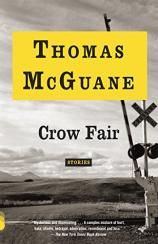Crow Fair: Stories
Review
Crow Fair: Stories
You don’t forget a story like “Motherlode.” It’s the centerpiece of Thomas McGuane’s latest book, CROW FAIR, and rests at its heart between 16 other remarkable tales. “Motherlode” is as wayward a short story as one will come across. It bares the intricacies of a novel-length thriller, with the subtle tone of a Coen brothers film, and in the refined manner only a seasoned author such as McGuane can bring.
Like all the stories in CROW FAIR, “Motherlode” is set in McGuane’s Big Sky country, a fictional place akin to literary landscapes like Sherwood Anderson’s WINESBURG, OHIO. We’re not quite looking at “grotesques” here, though. In McGuane’s world, truths come not so much from a search for them and then having them dismantle you, but rather having them realized in unsaid ways. Trouble already appears to be in place deep down, and no one seems to know quite how to express it. Consider the piece “A Long View to the West,” in which a dying father’s war stories get the cynical inner-commentary of his son, Clay. (Here we go, Clay thinks). By the end, being on the opposite end of death and hearing it accepted has Clay moved unexpectedly. Even the shorter affairs like “The Casserole” tell us much about communication from one generation to the next. Is there really anything so wrong with storing a casserole in a lunch pail? To the unnamed narrator’s in-laws, the implied answer is yes, as in the next scene he is returning on a ferry back home.
Concerning stories like “Motherlode,” where we meet Dave, a cattle breeder who does business with ranchers throughout the midwest, I believe we’re looking at McGuane’s most complete work. All the main themes --- family detachment, mental illness, missed communication --- are at play here. Dave has a gift for detecting cow births early on, being “a genius preg tester” with his informal system. After feeling a cow’s uterus and motioning around, going “mouse, rat, cat, fat cat, raccoon chihuahua, beagle,” he can tell exactly how pregnant the cow is. That’s the comic in McGuane at work. It’s displayed well throughout CROW FAIR and works here to give Dave a feeling of meaning. It’s his one and only gift.
"I believe we’re looking at McGuane’s most complete work. All the main themes --- family detachment, mental illness, missed communication --- are at play here."
But when Dave gets held up at gunpoint only a few pages in, it’s an unorthodox turn. Like in previous stories to that point, such as “Grandma and Me” and “The House on Sand Creek,” McGuane has the ability to lead us into comfortable territory and then drop us on our head. In the latter, a young couple is challenged by the child of infidelity. In the former, an idyllic picnic is changed by a corpse in a river. No story in CROW FAIR is ordinary or leads quite where you expect. In “Motherlode,” Dave is taken in by the man who holds him up. They drive out through Big Sky country where Ray is meeting for the first time in person a woman he chatted with online --- a con artist named Morsel who bootlegs Oxycontin. It’s an exciting turn for Dave. And he goes with it.
To describe McGuane’s stories is a little bit like telling someone about your own dysfunctional family. It’s really best if one sees for themselves the chaos at work. In the opening story, “Weight Watchers,” a young man who works construction takes in his overweight father, whose wife has kicked him out until he loses weight. The generation gap makes them strangers, and neither wants to bridge it. The father, who owns a booking agency for aircrafts, values stocks and bonds, while the son is an alienating person, intent on being a forever bachelor. The father ends up losing weight but is relegated to a hotel. The final lines of the story highlight the issue: “It’s not that there’s anything wrong with my ability to communicate: I have a cell phone but I only use it to dial out.” It’s a tone that rings through the rest of the book.
McGuane’s lines, especially his final ones, are a lesson in precision. Consider “On a Dirt Road,” in which a man suspects his wife to be cheating. Sitting at home during the final scene as she comes in, a bowl of popcorn in his lap, he attempts to confront her in a lie by asking how her time at a restaurant was. She replies by asking, “Did you put butter on this?” “No,” the husband answers back. And then we’re given the final, strangely haunting line, “So how shall we leave it?” It’s as much a question to the reader as it is to her husband. How shall you interpret this? Of course, in McGuane’s comical fashion, she also may be talking simply about the popcorn.
Thomas McGuane does what all authors strive to do --- not just say the unsayable but say it succinctly. His words fit like pieces in a puzzle. Those who practice the craft will admire the risks taken and the jumps in narrative, but readers outside the world of writing will also appreciate CROW FAIR. McGuane is not one to build suspense, but in any sentence at any turn, his stories can and do change dramatically, the best example being “Motherlode.” Poor Dave, he never felt a thing.
Reviewed by Stephen Febick on April 2, 2015
Crow Fair: Stories
- Publication Date: March 8, 2016
- Genres: Fiction, Short Stories
- Paperback: 288 pages
- Publisher: Vintage
- ISBN-10: 0345805917
- ISBN-13: 9780345805911











